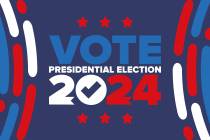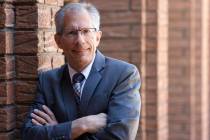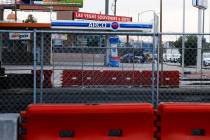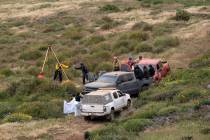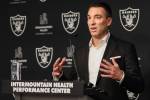One year at the helm
WASHINGTON -- From the day he entered the Senate 20 years ago, Harry Reid wanted to be majority leader. • After one year on that job, he might personify the adage that you should be careful what you wish for. • Gone is the elation from the 2006 election upset when Democrats won the majority in both the House and Senate. • Reid ended his first year as Senate majority leader with a whimper, not a bang, as President Bush and Republicans in Congress forced Democrats to cave on annual spending bills and additional funds for the Iraq war. • "George Bush compromises nothing," Reid said, practically biting off the word "nothing." • Reid pulled a pamphlet from his suit jacket and quoted legendary Irish statesman Edmund Burke three times during an interview. • "All government, every virtue and every prudent act is founded on compromise," Burke said. • Nevada's elder statesman, who turned 68 in December, leaned forward in his chair. "People say, 'Well, why don't you work with moderate Republicans?'" Reid paused before delivering a punch line.
"There aren't any."
TOUGHEST JOB IN WASHINGTON
Reid's job is tougher than the president's, according to Rutgers political science professor Ross Baker.
"I don't think there has ever been a more difficult time to be Senate majority leader because of the polarization of American politics. It's like walking a tightrope across Niagara Falls," Baker said.
While Democrats won a numerical majority in 2006, Baker said, they did not win a working majority. There are 51 Democrats in the Senate when it takes 60 votes to get anything done.
Not only must Reid maintain harmony among Democratic senators whose views span the political spectrum, he also must cope with an increasingly restless liberal base demanding legislative results.
"The one thing I'm proud of, with all the divergent views within my caucus, we have been together on virtually everything every time," Reid said.
"I would like to offer someone else the opportunity to see how they could keep the group together any better than I have," he said.
Norm Ornstein, a resident scholar at the American Enterprise Institute, described Reid's first year as majority leader as a disappointment.
"I know Reid is not a traditional leader and he's not at his best explaining the Senate position, but he is a master on the floor; he knows the rules, and I thought, in his quiet way, he would command the loyalty of his own majority to make the Senate work better than it has," Ornstein said.
Reid's efforts to reach across the aisle have been rebuffed by the White House and Republicans who are only too happy to leave what they call the "do-nothing Democratic Congress" twisting slowly in the wind.
"He found out that it's harder to deal with a minority than it is to frustrate the majority," said Eric Herzik, a political science professor at the University of Nevada, Reno.
"He shifted sides (from minority to majority leader) and somewhat got a dose of his own medicine," Herzik said.
REID'S 10 BILLS
On Jan. 4, 2007, his first day as majority leader, Reid walked to the Senate floor and introduced 10 bills, on topics ranging from energy independence to immigration reform.
"We must -- I repeat again and again -- work together," Reid said.
A year later, some version of four of those bills -- ethics reform, a minimum-wage increase, homeland security recommendations and more funding for college students -- have become law.
But the other six bills languish.
And what has Nevada gained from Reid's first year as Senate majority leader?
"How about the Nevada (presidential) caucus, which is one of the best things that has happened to Nevada," Reid said.
But Reid helped persuade the Democratic Party to choose Nevada for the Jan. 19 presidential caucus in 2006, while he was still Senate minority leader.
"The only thing that has happened in Nevada since he became majority leader is that his popularity has plummeted," Herzik said.
Recent polls have shown Reid falling consistently below 50 percent in approval ratings in Nevada.
He insists his numbers will improve as soon as the Democrats choose their presidential nominee in 2008.
"I am taking all the spears from Bush," Reid said. "But when we get a nominee -- whoever he or she may be -- I think you will see a change because I won't have to take all the spears."
Eric Schickler, a political science professor at the University of California, Berkeley, said Reid has not succeeded in projecting the image of an effective national leader.
"I think, between Reid and (House Speaker Nancy) Pelosi (D-Calif.), the Democrats don't have a compelling voice in Congress to put up against the Bush White House," Schickler said.
NO DIALOGUE WITH BUSH
Reid said he never expected the difficulty he has encountered working with the Bush administration.
Even though he is arguably the third most powerful person in the nation, Reid has no dialogue with Bush.
"I'm surprised that Senator Reid is even interested in sitting down with the president he has referred to as a loser, the worst president, and a liar, not once but twice," White House spokesman Alex Conant said.
Nevertheless, Conant said, Bush has instructed his staff to continue working with Reid in hopes of finding common ground with the Senate majority leader on issues important to the U.S. people.
"You never want to get into a duel with a dying man," said Baker, the Rutgers professor, who said Bush has nothing to lose by stonewalling Reid.
Reid's relationship with Vice President Dick Cheney, who was his White House contact when he first became Democratic leader in 2005, has deteriorated into an exchange of insults.
When he needs to talk to the White House, Reid said he calls the president's chief of staff, Josh Bolten.
Reid is more upbeat about Senate Minority Leader Mitch McConnell, R-Ky., even going so far as to recently pledge he will not criticize McConnell off the Senate floor.
"I find my relationship with Mitch McConnell one that has more positives than negatives. He can make a deal," Reid said.
"As soon as we get a new president, it will be better for our relationship."
NEW TARGET: 2008 ELECTIONS
Having all but given up on working with Republicans, Reid seems determined to beat them at the polls this year.
"I think they're going to have to loosen up. They are walking into oblivion," Reid said.
"(Democratic pollster) Stan Greenberg says we'll pick up nine seats," he said. "Nine seats would give us 60 votes."
If a Democratic president is elected this year and Democrats build on their majorities in the House and Senate, Reid would be in a position to steer a legislative agenda through Congress.
But Washington political analyst Stuart Rothenberg said Reid might be better off if a Republican is elected president in 2008 instead of a Democrat.
Reid won't be able to blame Bush for his problems after this year, and expectations for the Senate majority leader are likely to increase dramatically if a Democrat is in the White House in 2009.
"Reid will have to carry the (Democratic) president's water, and it may taste sweet in Nevada but I bet you a bunch of it doesn't," Rothenberg said.
Reid already has collected more than $2.5 million for his race for a fifth term in 2010. Although he said he is not worried about ending up like his predecessor, former Senate Democratic leader Tom Daschle, who was defeated in 2004, Reid added, "maybe I should be."
Last year, Reid looked forward to starting his new job, comparing it to eating "gravy and mashed potatoes."
Even after the difficulty of his first year as Senate majority leader, Reid said he still feels like he's a major league baseball player appearing in the all-star game.
"It's a wonderful job," he said. "I'm so fortunate to have it.











